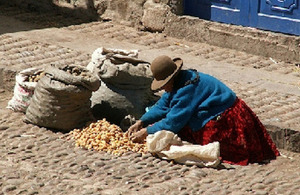DFID Research: Bridging research and policy in Latin America
DFID-finded research shows that the agricultural sector of the southern Peruvian Andes is vulnerable to the effects of imports from the US.

Woman selling potatoes, Pisac, Peru. Picture: COPLA
The Trade and Poverty in Latin America programme (COPLA - Comercio y Pobreza en Latinoamerica) is a 2 year DFID-funded programme of action research that aims to increase and improve the quality of evidence-based policy dialogue on trade, poverty and social exclusion - a heavily politicised issue in the region. It is managed by the Overseas Development Institute (ODI) in London and implemented by Latin American partners at the regional and national level in Central America, Peru and Bolivia.
Evidence, recently presented by COPLA-Peru, points out that the agricultural sector of the southern Peruvian Andes, where the poorest people in the country live, is particularly vulnerable to the effects that the imports of goods from the U.S. - whether farmers want to compete with these products or not. And the intensification in rural poverty may have negative knock-on effects, for example through increased school drop-out rates of both boys and girls who have to help generate additional income for their families.
The study Trade policy and poverty in Peru. How do free trade agreements (FTA) impact rural poverty? by Waldo Mendoza, COPLA Peru’s Research Coordinator, indicates that it is essential to design complementary politics to protect those who are most vulnerable to the negative effects of the Free Trade Agreement with the U.S., which, otherwise, would only benefit a limited number of better-off national producers. Hence COPLA-Peru is continuing to gather evidence to inform and influence decision makers in the design and development of policies to protect the poor and the most excluded during the implementation of the Free Trade Agreement (FTA). This is the conclusion arrived at by Sheila Page, an Associate of ODI in a study for COPLA.
This message has been difficult to communicate in a heavily politicised environment. In December 2008, CIES(Consorcio de Investigación Económica y Social), the COPLA-Peru coordinator, organised a week-long conference on a range of policy issues that included pro-poor growth and trade. Joseph Stiglitz’s keynote speech caused a stir among the government and the media when he questioned the expected benefits of the FTA Peru had signed with the U.S. However, the government’s negative reaction, and in particular that of the Peruvian President Alan Garcia, soon turned into a demand for new evidence to address the concerns made public by COPLA-Peru among others.
The government’s participation in subsequent COPLA-Peru events has been forthcoming. In March 2008, CIES organised a successful public meeting labeled: ‘FTA: Opportunities and challenges for social inclusion’. The event, and a related press conference, were widely reported in the national media. The same week, COPLA-Peru and ODI were invited to a private meeting with the Minister of Trade and Tourism, Dr. Mercedes Araoz, and her personal advisor. This turned out to be the first step of a planning process to better align the programme’s research agenda to the government’s knowledge needs. This meeting has been invaluable: better relations with the government have facilitated COPLA-Peru’s efforts to inform policy and foster better linkages between the public sector and civil society.
Recently, the government, including members of the Foreign Ministry, attended the seminar-workshop ‘Latin America - European Union relations and the Lima Summit’, organised by Dr. Alan Fairlie, in May 2008, who responsible for one of the case studies developed by COPLA-Peru. The event and the government’s endorsement provided a platform for new stronger linkages with the Latin American Trade Network - one of the key audiences for COPLA at the regional level.
After some reservations at the start of the programme, when the FTA with the U.S. was still being debated, the government is now openly engaging in the issue of making trade more pro-poor. In fact, the government is actively seeking stronger linkages between trade and social policies - as evidenced by the participation of a representative of the National Competitiveness Council (Peru Comite), which is part of the Prime Minister’s Office, and the Trade Minister’s advisor in COPLA-Peru’s Advisory Board.